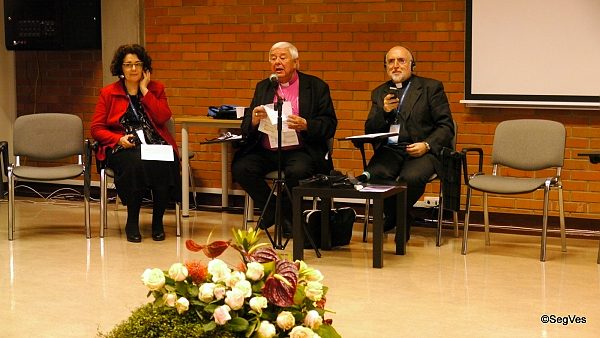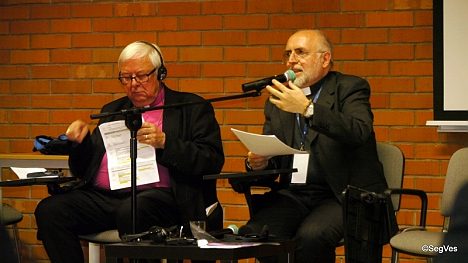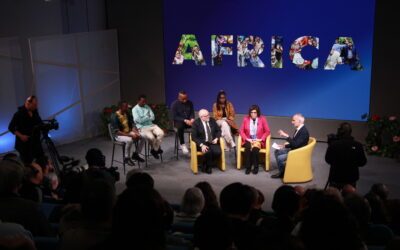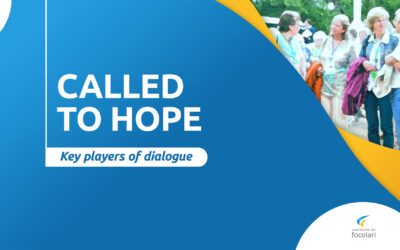
 Moran explained: “The charism God had gifted Chiara has its roots in an ecclesial dimension that can be shared by all the confessions, because it draws inspiration from the heart of the Gospel. And this can be related to the nature of the spirituality which arose from this charism: a spirituality that sets a ‘dialogue of life’ as the pre-condition to ecumenical dialogue. It is an ecumenism of ‘love,’ ‘truth,’ and ‘of the heart,’ terms which also recur today to underline a reciprocity of love that does not replace theological dialogue, but gives the opportunity to grow closer, in a profound ‘exchange of gifts’ that enrich one and the other.” Unity and reconciliation start in the heart, in the encounter between people in a warm reception, Morán underlined. But “the unity we live or seek,” he argued “is not uniformity, it is the Holy Spirit himself who generates diversity.” Therefore, it is not a theoretical approach, but a dynamic experience of evangelical love, an ecumenical laboratory which, in the experience of the Focolare, now binds Christians belonging to over 300 Churches, and which spread, at least as a self-awareness within numberless ecclesiastic settings. “Dialogue of life is fruitful” – he added – “also in and among the parishes of various Churches: a twinning that helps to mutually know one another and find new forms of collaboration for social and cultural projects. Also the youths belonging to various Churches are committed in the front line to support primary emergency actions or aid to the most needy.” What are the repercussions at theological level? “Some experts were called to take part in the official theological dialogues. Also at regional and especially diocesan levels, many have personally undertaken the commitment. An example, among many, are the theological symposiums established between the professors of the Rumanian-Orthodox Faculty of Cluj-Naponica (Romania) and the Sophia University Institute of Loppiano (Italy), where last 14 December an ecumenical chair was established, dedicated to Patriarch Athenagoras and Chiara Lubich. Silently but tenaciously, God is tracing an irreversible path to reach universal brotherhood, his design on humanity.” Morán ended his reflection with the words of the “Ottmaring Declaration” with which the Focolare Movement inaugurated the celebrations for the fifth centenary of the Reformation: “With all our hearts we want to support the Churches in the commitment to reach a full and visible communion. We shall do all that is possible to make our activities and initiatives be substantiated by this open and fraternal attitude among Christians.” Read the whole text
Moran explained: “The charism God had gifted Chiara has its roots in an ecclesial dimension that can be shared by all the confessions, because it draws inspiration from the heart of the Gospel. And this can be related to the nature of the spirituality which arose from this charism: a spirituality that sets a ‘dialogue of life’ as the pre-condition to ecumenical dialogue. It is an ecumenism of ‘love,’ ‘truth,’ and ‘of the heart,’ terms which also recur today to underline a reciprocity of love that does not replace theological dialogue, but gives the opportunity to grow closer, in a profound ‘exchange of gifts’ that enrich one and the other.” Unity and reconciliation start in the heart, in the encounter between people in a warm reception, Morán underlined. But “the unity we live or seek,” he argued “is not uniformity, it is the Holy Spirit himself who generates diversity.” Therefore, it is not a theoretical approach, but a dynamic experience of evangelical love, an ecumenical laboratory which, in the experience of the Focolare, now binds Christians belonging to over 300 Churches, and which spread, at least as a self-awareness within numberless ecclesiastic settings. “Dialogue of life is fruitful” – he added – “also in and among the parishes of various Churches: a twinning that helps to mutually know one another and find new forms of collaboration for social and cultural projects. Also the youths belonging to various Churches are committed in the front line to support primary emergency actions or aid to the most needy.” What are the repercussions at theological level? “Some experts were called to take part in the official theological dialogues. Also at regional and especially diocesan levels, many have personally undertaken the commitment. An example, among many, are the theological symposiums established between the professors of the Rumanian-Orthodox Faculty of Cluj-Naponica (Romania) and the Sophia University Institute of Loppiano (Italy), where last 14 December an ecumenical chair was established, dedicated to Patriarch Athenagoras and Chiara Lubich. Silently but tenaciously, God is tracing an irreversible path to reach universal brotherhood, his design on humanity.” Morán ended his reflection with the words of the “Ottmaring Declaration” with which the Focolare Movement inaugurated the celebrations for the fifth centenary of the Reformation: “With all our hearts we want to support the Churches in the commitment to reach a full and visible communion. We shall do all that is possible to make our activities and initiatives be substantiated by this open and fraternal attitude among Christians.” Read the whole text
Get out of your own box!
Get out of your own box!




0 Comments